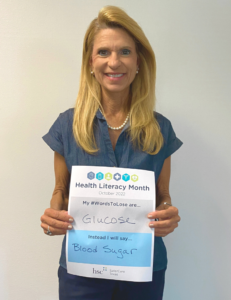SaferCare Texas Presents #WordstoLose for Health Literacy Month
- October 7, 2022
- By: Rachel Swink
- On Campus
Related Links

In recognition of Health Literacy Month, The University of North Texas Health Science Center at Fort Worth’s SaferCare Texas is launching a #WordsToLose campaign to emphasize the importance of using words that people can easily understand so that they can make appropriate health decisions.
As a part of the campaign, HSC encourages area residents to download the #WordsToLose sign here. In the first box, residents should write the health care word or phrase they will stop using. In the second box, they should write the word or phrase they will replace it with. They are then encouraged to take a photo with their sign and share it on social media with the hashtags #WordsToLose and #HealthLiteracyMonth.
“Health literacy, to me, occurs when health information is presented in a way that, no matter a person’s circumstances or lived experience, that information can be accessed, understood, practiced and navigated in people’s everyday lives to make well-informed health decisions for themselves and others,” said Teresa Wagner, interim director of SaferCare Texas.
SaferCare Texas was founded in response to the national challenge to improve patient safety. The department works to eliminate preventable harm by improving communities through patient safety innovation.
Roughly half of American adults read below a sixth-grade level, yet most health information — educational pamphlets, discharge instructions, medication details — is written at a 12th-grade level. This gap leaves room for patient misunderstandings and mistakes, which can lead to poor health outcomes and increased medical costs. At the broader public level, it also creates space for misinformation and disinformation to take hold.
According to data from SaferCare Texas, health literacy costs the U.S. economy an estimated $236 billion dollars every year, and health care costs are four times higher for adults with low health literacy levels. Only 12% of U.S. residents are proficient in the health literacy skills they need to effectively navigate and use the nation’s health system.
Texas Gov. Greg Abbott proclaimed October 2022 as Health Literacy Awareness Month. Wagner participates in a national committee dedicated to having every state in the nation proclaim October as Health Literacy Month. Texas is the first to do so. Anyone can develop and submit a health literacy proclamation to a state governor’s office for the month of October by using this toolkit.




Social media